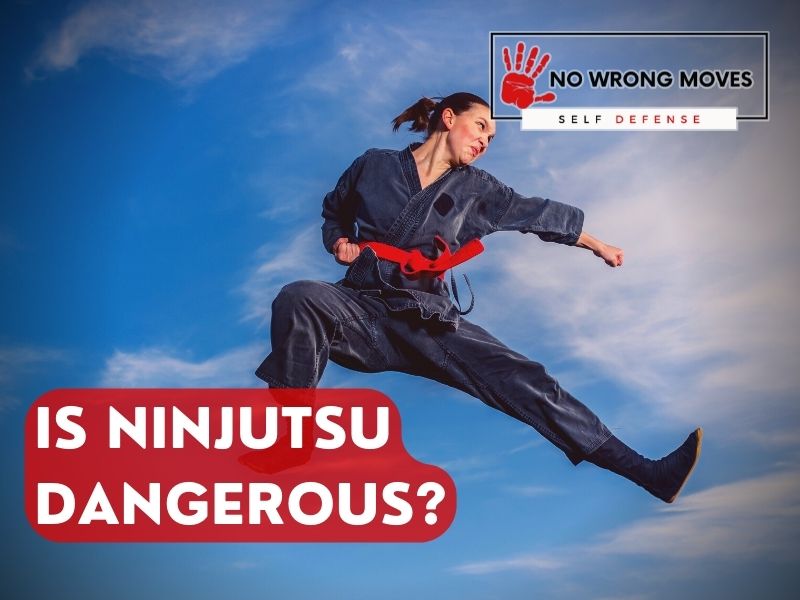
Looking to get into Ninjutsu for self-defense? If you are, then you've made a great choice. It's an incredible martial art that's definitely worth looking into.
But if you're entirely new, then you're probably still wondering, "is Ninjutsu dangerous?" And I get you, I totally do! And you'd be entirely reasonable for thinking this way, especially since safety should always be your top priority.
Tons of people ask themselves that question before actually getting started with the hobby, and it's entirely a sound question thing to be curious about in the first place. Thankfully for you, I've got all the facts you need right here in this article. Let's get into it!
Is Ninjutsu Dangerous? The Risks Explained

A few of the potential dangers you're likely to encounter in Ninjutsu include possible injuries that you might sustain while you practice in the discipline. More specifically, there's a fair risk of head injuries, neck injuries, and concussions when training with weapons or falling during techniques.
There's also a chance for joint dislocations or broken bones, especially if techniques are executed with incorrect form.
Of course, Ninjutsu practitioners are aware of the inherent dangers of the physical activities they do. That's why they take precautionary measures to minimize the risks associated with their training.
For example, they train in padded environments and use safety equipment, like mouthguards and protective gloves. They're pretty simple precautions in general, but they do loads for avoiding serious injuries that could occur during their training.
The Most Common Injuries Sustained In Ninjutsu

Just like any physical activity, practicing Ninjutsu can come with its fair share of potential injuries. These can range from minor sprains and strains, all the way to more serious fractures, head injuries, neck injuries, and back injuries.
Fractures, for example, are a potential risk if proper technique isn't reasonably applied. Head injuries, such as concussions, can also occur during sparring or rough contact with your fellow practitioners.
Neck injuries can result from grappling techniques that involve twisting or applying pressure to the neck. And finally, back injuries can occur while you're performing movements that involve bending, twisting, or lifting.
They can be pretty concerning, as you can likely imagine--and you probably expected no less, coming from a martial art built for use in war.
But that's exactly why you need to take proper safety precautions and practice under the guidance of a qualified instructor. If you do, then you'll drastically reduce the odds of you getting injured.
Additional Risks Involved When Practicing Ninjutsu

Ninjutsu, like any other contact sport, poses the risk of contracting infectious diseases such as MRSA or hepatitis. They aren't at the very top of the list of things you'd normally worry about, but they're still there.
This kind of risk is mostly due to the shared mats and equipment that may come in contact with bodily fluids--sweat, saliva, blood in some rare cases, the likes.
Fortunately, practicing good hygiene and regularly cleaning and disinfecting equipment can drastically reduce the kinds of risks you're likely to run into, to the point that you likely won't even need to worry about them anymore.
You want a safe, healthy training environment, so be sure to pick a dojo that prioritizes cleanliness and sanitation. A reputable dojo will take the measures necessary to uphold cleanliness, even if it's as simple as providing accessible hand sanitizers and disinfectant wipes.
Of course, most go all the way, regularly washing and sanitizing mats and equipment, as well as enforcing strict rules on personal hygiene. That's the kind of dojo you should want, for the most part.
The likelihood of you contracting an infectious disease definitely isn't high, I know, but it's still worth it for you to be aware of these kinds of risks and to take precautions to protect yourself and others.
Prioritizing proper hygiene isn't too difficult, thankfully, nor is maintaining a good standard of cleanliness. If you uphold these, you'll be able to practice Ninjutsu safely.
How To Stay Safe When Practicing Ninjutsu

There are definitely a few risks inherent to practicing Ninjutsu, I won't deny that. But I will also tell you that a lot of these can be minimized with proper training and supervision. If you're careful and know what you're doing, then there's very little you should be worried about.
And just so we're on the same page, being "careful" in this case means:
- Warming up and stretching before every training session;
- Wearing the proper protective gear, such as a mouthguard and headgear
- Listening to your body and not pushing through pain or injury;
- Practicing good hygiene and cleaning all equipment regularly;
- Avoiding unsanitary environments.
Granted, you can be extremely careful and still have an accident happen to you, it's true. That's why it's an accident, after all. Try to research beforehand on what to do in case these things happen to you.
Keep in mind the signs and symptoms of a concussion, for example, such as nausea and confusion, and have contacts with medical assistance ready in case you ever need something.
The Wrap-Up
Well, there you have it! Ninjutsu, like any physical activity, comes with its fair share of risks, but they can be minimized by following proper safety precautions and hygiene practices.
Injuries and infectious diseases are potential dangers, yes, but they absolutely shouldn't deter you from practicing this incredible martial art.
So for those of you interested in exploring the world of Ninjutsu, don't be afraid to take that first step. You'll be glad you embarked on this journey of self-discovery and growth.
Curious to learn more about Ninjutsu? Click here!
[author-box-jpx-fitness]

